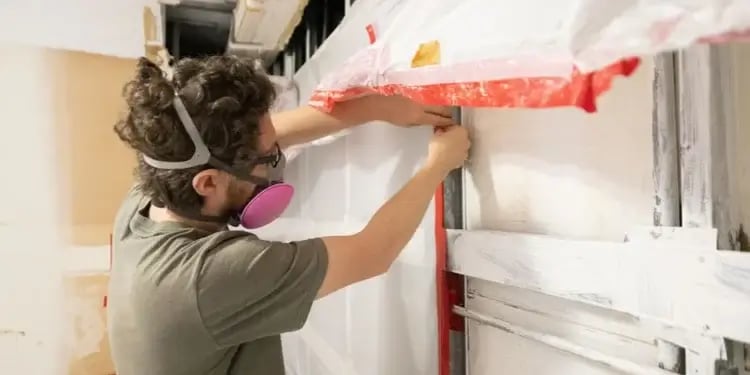Share this
ICRA Best Practices: Safe Healthcare Construction
by HEPACART on Jul 03, 2023

In any public space, safety and health concerns include a focus on the quality of the air. However, hospitals and other medical facilities bear an even greater responsibility when it comes to patient safety. The issue begins with dust and airborne particles. These tiny particles can carry bacteria and viruses, compromising the overall air quality when they're stirred into the air.
It's crucial to maintain and minimize these particles in order to meet the necessary air quality safety standards. ICRA standards can help guide the facility and the healthcare teams working to protect them during construction or renovation projects.
This blog will cover how important of ICRA (Infection Control Risk Assessment) standards are for reducing the effects of construction. By implementing guidelines, you can minimize the risks associated with and ensure the safety of patients, workers, and the general public.
ICRA Is Critical for Healthcare
Within the healthcare sector, ICRA standards are essential for preventing the transmission of secondary infections during hospital stays. Approximately 99,000 people die each year due to secondary infections, many of which can be traced back to the HVAC systems. With numbers this high, it is clear that quality air filters have become essential to have so you can ensure a healthy facility.
With the guidance of ICRA standards, you’ll be ready to implement practices to reduce the spread of infection through renovation projects. ICRA teaches healthcare managers and workers how to contain and control pathogens, protect patients without disruptions, and manage the airflow between different areas within a facility. By implementing these guidelines, hospitals can reduce the risk of secondary infections, creating a safer environment for patients and healthcare professionals.
Equip Your Medical Facility With ICRA
Construction projects within occupied healthcare facilities present unique challenges and potential risks. ICRA standards provide a framework for specific protection levels for various tasks. Ensuring the safety of patients during the entire healthcare construction process.
From the beginning, ICRA suggests categorizing your construction project by two measures. The type of construction you are completing and the population of your facility will be most at risk during the process.
By determining the risk that the specific work, ICRA will recommend measures that will protect the health and safety of your facility. ICRA also considers emergencies that can impact flow and the movement of debris. Enabling hospital staff to have more effective planning and mitigation strategies during unexpected outages or interruptions.
Keep Track of Your IAQ With ICRA Tools
To best adhere to ICRA protocols, daily checklists are a great tool to ensure strict compliance with safety practices. Keeping track of all safety measures with organized lists helps maintain safety standards throughout construction. Additionally, weekly reviews enable continuous evaluation, allowing safety teams and facility staff to plan adjustments and modifications as necessary.
Along with ongoing indoor air quality measures, monitoring negative air pressure with equipment to provide optical measurements and alarms is essential. Combining these practices ensures that potential issues are addressed before they allow for safety is put at risk.
Best Practices for ICRA Implementation
To achieve optimal safety standards, organizations should follow these best practices when implementing ICRA:
Invest in Technology for Construction in Occupied Facilities
Investing in advanced technologies can significantly minimize disruptions and reduce pathogen transmission risk when undertaking construction projects within occupied healthcare facilities. Incorporating HEPA air filtration units can effectively trap and filter out pathogens, ensuring a safer environment for patients and workers.
Conduct Site Inspections
Regular site inspections are crucial for identifying potential hazards and evaluating compliance with ICRA guidelines. These inspections should be conducted by trained professionals well-versed in infection control and safety protocols. By knowing and addressing these risks, you can prevent issues and use infection control measures to ensure the safety of everyone.
Develop Comprehensive Safety Plans
Creating comprehensive safety plans that outline procedures, protocols, and contingency measures is essential for successful ICRA implementation. These plans should consider all aspects of the construction project, including logistics, traffic flow, material handling, and waste management. You can mitigate risks and promote a safe working environment by defining roles and responsibilities, establishing communication, and installing safety protocols.
Understand the Risk of Infection
Staying informed on research and developments in infection control and dust containment is the best way to manage risk continually. By understanding how pathogens spread and preventive measures, organizations can implement the most appropriate strategies to minimize the risk of infection. Ongoing training and education programs for healthcare construction workers and healthcare professionals can also help to foster a culture of infection control throughout the facility, even beyond the construction projects you may be completing.
Stay Ahead of the Safety Standards
The field of infection control is continually a factor in every construction project. You need to know and stay ahead of the standards. By staying aware of ICRA Standards, your facility can always improve infection control protocols. You will also ensure that construction projects align with the most effective practices — ultimately keeping patients and staff safer.
To dive deeper into ICRA standards and learn more about implementing the guidelines, download our guide to ICRA for healthcare facilities. By prioritizing infection control and safety, we can all contribute to a safer and healthier future for everyone.

